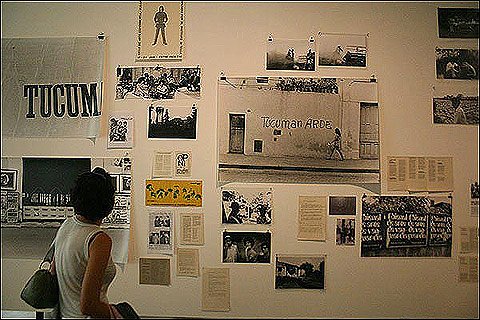Graciela Carnevale
(b. Marcos Juárez, Córdoba, 1942) lives and works in Rosario, Argentina. Carnevale was a member of the Grupo de Arte de Vanguardia de Rosario (Rosario Avant-Garde Art Group), a collective that created a complete upheaval in the local art scene from 1965 until it disbanded in 1969 (when its members decided to abandon art altogether). Together with a group of artists form Buenos Aires, carried out the now legendary artistic and political happening, "Tucumán Arde". On October 8, 1968, she took part in the Ciclo de Arte Experimental –organized by the same group—with the "Acción del Encierro": the public attending the opening was locked up without prior notice or explanation for more than an hour in the exhibition room. Carnevale sought to unleash a liberating violence in response to the violence she herself was exercising, as a metaphor for the opposing forces in the capitalist system, closely following the lines of Frantz Fanon in "The Wretched of the Earth" which was read assiduously by that generation. The episode ended abruptly when security forces intervened, thereby definitively putting an end to the Ciclo. More recently, in the 90s, Graciela Carnevale returned to the production of art, working with different collectives at all times. She has worked continuously as an art teacher, both at the Universidad Nacional de Rosario and in her own workshop. Since 2003 she has been coordinating the independent initiative "El Levante" (The East) together with the artist Mauro Machado as an ongoing program of workshops and residencies for young artists, which has invigorated the Rosario art scene and contributed to its exchanges in other contexts. In charge of the documentary and photographic archive of the Grupo de Arte de Vanguardia, Carnevale gathered and looked after those materials since their creation, even through the difficult years of Argentina’s last dictatorship. In recent years, as interest has grown in the Argentinean avant-garde movement of the 60s, the archive became a necessary space for research and has even been invited to take part in leading international programming, such as the most recent Documenta (Kassel, 2007). The following interview contains excerpts of a long conversation with Ana Longoni, in which Graciela talks about the vagaries of setting up and disseminating the archive and particularly about the links that led to its inclusion in Documenta, along with issues surrounding its current reception. Ana Longoni holds a Ph.D. in Art History and is a writer, researcher, and professor on the Theory of Media and Culture at the Faculty of Philosophy and Literature, and of the Art and Politics in Twentieth-Century Argentina seminar at the Social Sciences Faculty of the University of Buenos Aires.
|







